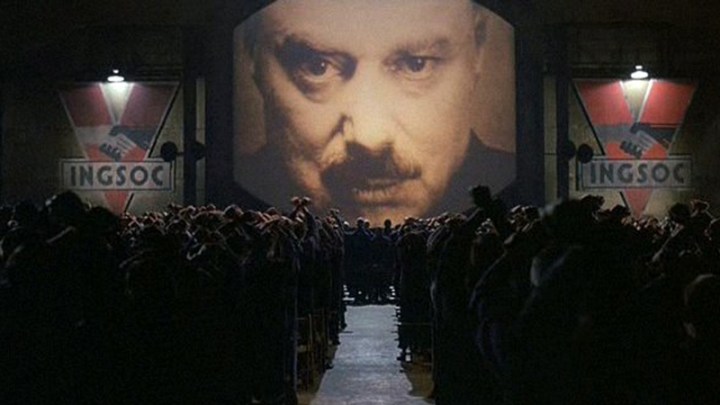
In 1984, Apple said 1984 wouldn’t be like 1984. George Orwell’s novel describes a dystopian surveillance society as a warning, and Apple positioned itself as a counter to that disturbing future. But here’s the thing: 2019 looks a lot like 1984. And we’re remarkably comfortable with it.
Orwell published one of the great English-language novels on June 8, 1949, 70 years ago today. His book details a society perpetually at war, ruled by an enigmatic figure known only as “Big Brother.” Thanks to secret surveillance, Big Brother’s totalitarian government knows all, punishing thoughtcrimes before they take place and rewarding conformity.
When Steve Jobs and his upstart rebels at Apple used the framework of Orwell’s book to tell a dark story about conformity in the computing world, it seemed distant. In Apple’s famous ad, a hammer-wielding champion blows apart massive screens showing the sneering face of Big Brother.
Apple was right. 1984 wasn’t like 1984, with its goofy suits and Alf and Talking Heads videos on MTV. But today? For starters, it’s hard to ignore the similarities between Big Brother and Donald Trump, whose cult of personality commands, for some, a similar unwavering fealty, even if his attention span is hopefully not as constant.
Look beyond the Big Brother we’ve elected and you’ll see that we’ve built the surveillance society we’ve feared for so long — and maybe it’s not such a problem after all.
We live in a world where devices are constantly listening. The power of voice control is profound, allowing us to check whether we locked the garage door simply by speaking aloud. We’re worried about digital eavesdropping — which is partially why Amazon just allowed you to ask Alexa to forget what you just said — but mostly we’re okay with it.
Far from being clobbered into submission by a totalitarian regime, we’ve sacrificed our privacy for the sake of convenience. I can ask Siri to order a pizza, ask Google to play my favorite song, or have Alexa turn on the air conditioning. And sure, some people are worried, but that’s not stopping us from using this tech.

Some of these devices are watching us. Consider Facebook Portal, a voice-activated telescreen that follows you around the room. It literally is watching your every move. Phones, computers and even TVs have cameras that watch us (or do they?).
While useful, these devices have instilled in many a sense of paranoia that’s profoundly at odds with the professed goals of smart home devices. When I brought home an Amazon Fire TV recently, my wife asked why I’d want to bring a device into the living room that spies on us. I couldn’t really argue.
Perhaps Big Brother isn’t bothering us at all, considering the benefits we gain from today’s technology.
You can draw a line at the door: It’s fine in the house, with devices that you’ve bought and (hopefully) control. What happens when you leave, and enter the public space where even more devices are watching?
For the most part, people believe surveillance cameras make us safer. But the enormous screens on London’s Piccadilly Circus use cameras to analyze the makeup of the crowd to choose which advertisements to play, and it’s likely to get more directly and individually focused at breakneck speed. The power of facial-recognition through A.I. promises to actually track YOU — not just random people. And fears of what that could bring have led to California’s ban on such technology.
Still, is the loss of privacy a terrible thing? Trump aside, perhaps Big Brother isn’t bothering us at all, considering the benefits we gain from today’s technology. Hey Siri: 1984 wasn’t like 1984, but 2019 is.


